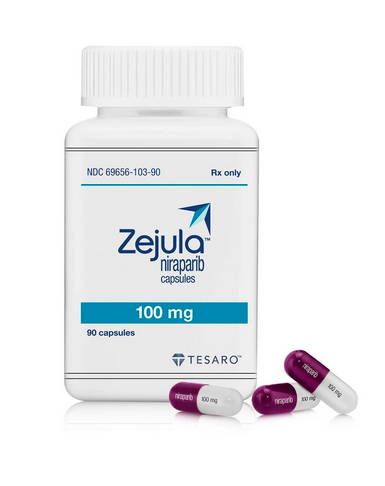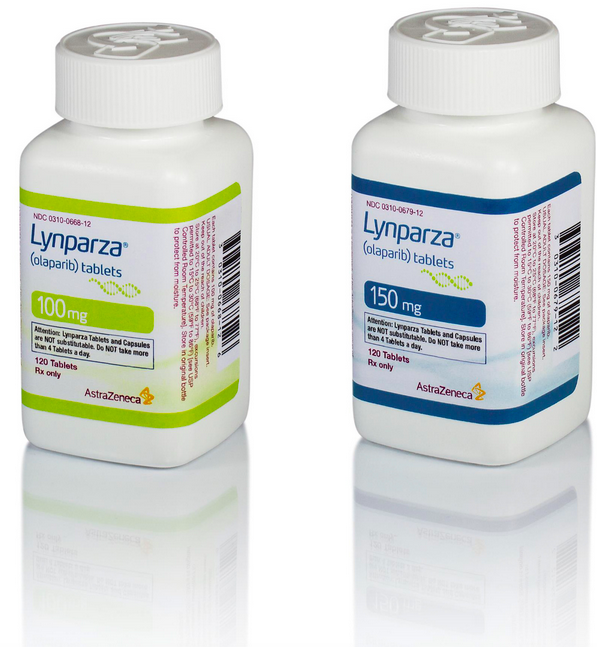Zejula (niraparib) vs Lynparza (olaparib)
Zejula (niraparib) vs Lynparza (olaparib)
Zejula (niraparib) and Lynparza (olaparib) are both PARP inhibitors used in the treatment of certain types of cancer, including ovarian cancer. Zejula is often used as a maintenance treatment for adults with recurrent epithelial ovarian, fallopian tube, or primary peritoneal cancer who are in a complete or partial response to platinum-based chemotherapy, whereas Lynparza has a broader range of FDA-approved indications, including for BRCA-mutated breast cancer, and as a first-line maintenance treatment in BRCA-mutated advanced ovarian cancer. The choice between Zejula and Lynparza should be made in consultation with a healthcare provider, considering individual patient factors such as specific cancer type, genetic mutations, prior treatments, and potential side effects.
Difference between Zejula and Lynparza
| Metric | Zejula (niraparib) | Lynparza (olaparib) |
|---|---|---|
| Generic name | niraparib | olaparib |
| Indications | Ovarian, fallopian tube, or primary peritoneal cancer maintenance; advanced ovarian cancer after complete or partial response to platinum-based chemotherapy | Ovarian, breast, pancreatic, and prostate cancer |
| Mechanism of action | Poly (ADP-ribose) polymerase (PARP) inhibitor | Poly (ADP-ribose) polymerase (PARP) inhibitor |
| Brand names | Zejula | Lynparza |
| Administrative route | Oral | Oral |
| Side effects | Thrombocytopenia, anemia, neutropenia, hypertension, nausea, constipation, vomiting, abdominal pain, mucositis, insomnia, headache, dizziness, fatigue | Anemia, nausea, fatigue, vomiting, neutropenia, respiratory infections, leukopenia, diarrhea, arthralgia/myalgia, dysgeusia, headache, dyspepsia, decreased appetite, dizziness, stomatitis, rash, and renal injuries |
| Contraindications | Hypersensitivity to niraparib or any of the excipients, myelodysplastic syndrome/acute myeloid leukemia, or with severe renal impairment | Hypersensitivity to olaparib or any of the excipients, pregnancy, and breastfeeding |
| Drug class | Poly (ADP-ribose) polymerase (PARP) inhibitor | Poly (ADP-ribose) polymerase (PARP) inhibitor |
| Manufacturer | GlaxoSmithKline (GSK) | AstraZeneca and Merck & Co. (MSD outside the USA and Canada) |
Efficacy
Efficacy of Zejula (Niraparib) in Gynecological Cancer
Zejula (niraparib) is an oral, once-daily poly(ADP-ribose) polymerase (PARP) inhibitor that has shown efficacy in the treatment of gynecological cancers, particularly ovarian cancer. It is approved for the maintenance treatment of adult patients with recurrent epithelial ovarian, fallopian tube, or primary peritoneal cancer who are in a complete or partial response to platinum-based chemotherapy. In clinical trials, niraparib has demonstrated the ability to significantly improve progression-free survival (PFS) compared to placebo. The NOVA trial, a pivotal Phase 3 study, showed that niraparib treatment extended PFS in patients with recurrent ovarian cancer, regardless of BRCA mutation status, indicating its benefit as a broad maintenance therapy.
Efficacy of Lynparza (Olaparib) in Gynecological Cancer
Lynparza (olaparib) is another oral PARP inhibitor used for the treatment of gynecological cancers. It is indicated for the maintenance treatment of adult patients with deleterious or suspected deleterious germline BRCA-mutated (gBRCAm) advanced ovarian cancer, who are in response to first-line platinum-based chemotherapy. Additionally, olaparib is approved for the treatment of BRCA-mutated HER2-negative metastatic breast cancer, which may be relevant as gynecological and breast cancers share some similar treatment approaches. In clinical studies, such as the SOLO-1 trial, olaparib has shown a substantial increase in PFS in patients with BRCA-mutated ovarian cancer, highlighting its role as a targeted therapy for this patient population.
Comparative Efficacy in Gynecological Cancer
While both Zejula and Lynparza have shown efficacy in the treatment of gynecological cancers, there are differences in their indications and the populations they serve. Niraparib is approved for a wider patient population in the recurrent ovarian cancer setting, including those without BRCA mutations, whereas olaparib's indications are more specific to BRCA mutation-positive patients. Comparative studies, such as head-to-head trials, would be necessary to fully understand the differences in efficacy between the two drugs in various subsets of patients with gynecological cancers.
Conclusion
In conclusion, both Zejula (niraparib) and Lynparza (olaparib) represent important advancements in the treatment of gynecological cancers, particularly ovarian cancer. Their efficacy in improving progression-free survival has been demonstrated in clinical trials, offering valuable options for maintenance therapy. The choice between these agents should be individualized based on patient characteristics, including BRCA mutation status, and in consultation with a healthcare provider. Ongoing research and clinical trials continue to refine the optimal use of these agents in gynecological oncology.
Regulatory Agency Approvals
Zejula
-
European Medical Agency (EMA), European Union

-
Food and Drug Administration (FDA), USA

-
Health Canada

-
Therapeutic Goods Administration (TGA), Australia

Lynparza
-
European Medical Agency (EMA), European Union

-
Food and Drug Administration (FDA), USA

-
Health Canada

-
Therapeutic Goods Administration (TGA), Australia

-
Medsafe (NZ)

Access Zejula or Lynparza today
If Zejula or Lynparza are not approved or available in your country (e.g. due to supply issues), you can access them via Everyone.org.
How it works

Make an enquiry
Choose the medicine you want to buy, answer a couple of questions, and upload your prescription to speed things up. We’ll get back to you within 24 hours.


Make an enquiry
Choose the medicine you want to buy, answer a couple of questions, and upload your prescription to speed things up. We’ll get back to you within 24 hours.


Breeze through the paperwork
We'll guide you through the required documents for importing unapproved medicine, ensuring you have all the necessary information.


Get a personalized quote
We’ll prepare a quote for you, including medicine costs and any shipping, administrative, or import fees that may apply.


Receive your medicine
Accept the quote and we’ll handle the rest - sourcing and safely delivering your medicine.

Some text on this page has been automatically generated. Speak to your physician before you start a new treatment or medication.
Let's talk
If you have any questions, call us or send us a message through WhatsApp or email:
Contact us




